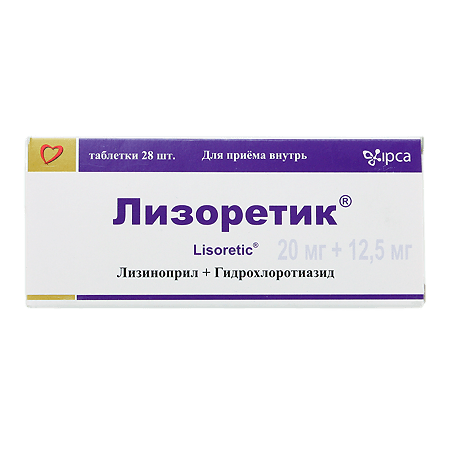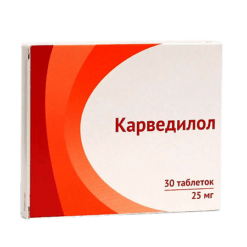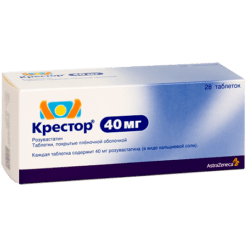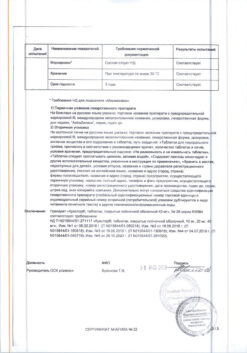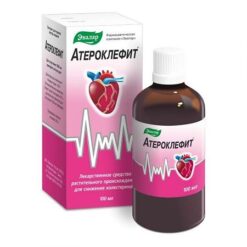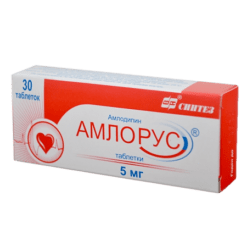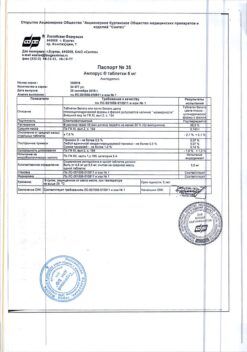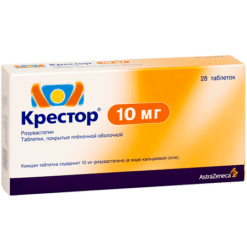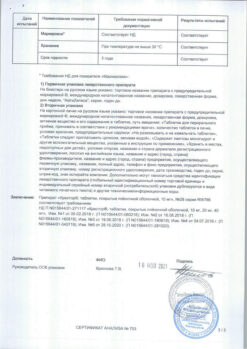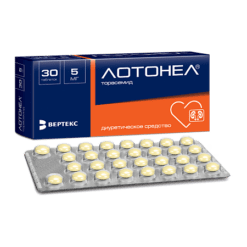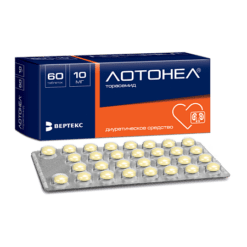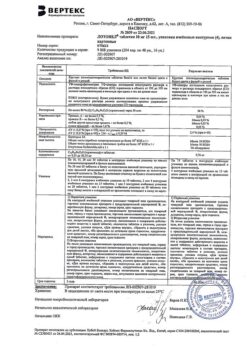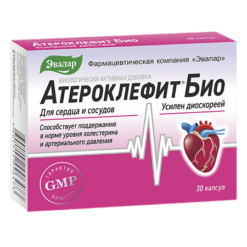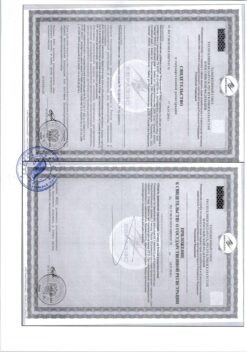No products in the cart.
Lysoretic, 20 mg+12, 5 mg tablets 28 pcs
€15.40 €12.83
Description
Lysoretic has an antihypertensive, diuretic effect.
Pharmacodynamics
Lysoretic is a combination of an angiotensin-converting enzyme inhibitor (lisinopril) and a diuretic (hydrochlorthiazide). It has antihypertensive and diuretic action.
Lisinopril. ACE inhibitor, reduces the formation of angiotensin II from angiotensin I. Reduction of angeotensin II leads to a direct reduction of aldosierone release. Reduces bradykinin degradation and increases prostaglandin synthesis. Reduces total peripheral vascular resistance, blood pressure (BP), preload, pulmonary capillary pressure, causes an increase in the minute blood volume and increases exercise tolerance in patients with heart failure.
Dilates arteries to a greater extent than veins. Some effects are explained by the effect on tissue retin-angiotensin systems. Long-term use reduces myocardial hypertrophy and resistive arterial wall hypertrophy. It improves the blood supply to the ischemic myocardium. ACE inhibitors prolong life expectancy in patients with chronic heart failure, slow the progression of left ventricular dysfunction in patients who have had myocardial infarction without clinical manifestations of heart failure. Onset of action in 1 hour, the maximum effect is determined after 6-7 hours, the duration – 24 hours. In case of arterial hypertension the effect is noted during the first days after the treatment start, the stable effect develops after 1-2 months.
Hydrochlorothiazide. Thiazide diuretic, diuretic effect of which is associated with disruption of reabsorption of sodium, chloride, potassium, magnesium and water ions in the distal nephron; it delays excretion of calcium and uric acid ions. It has antihypertensive properties; hypotensive effect develops due to dilation of arterioles. It has practically no effect on normal blood pressure. Diuretic effect occurs in 1-2 hours, reaches a maximum in 4 hours and lasts 6-12 hours.
The antihypertensive effect occurs within 3-4 days, but it may take 3-4 weeks to achieve optimal therapeutic effect. Lisinopril and hydrochlorthiazide, if used simultaneously, have an addetive antihypertensive effect.
Indications
Indications
Arterial hypertension (in patients for whom combination therapy is indicated).
Pharmacological effect
Pharmacological effect
Lysoretic has an antihypertensive, diuretic effect.
Pharmacodynamics
A lysoretic is a combination of an angiotensin-converting enzyme inhibitor (lisinopril) and a diuretic (hydrochlorothiazide). Has antihypertensive and diuretic effects.
Lisinopril. An ACE inhibitor, reduces the formation of angiotensin II from angeotensin I. A decrease in the content of angiotensin II leads to a direct decrease in the release of aldoserone. Reduces the degradation of bradykinin and increases the synthesis of prostaglandin. Reduces total peripheral vascular resistance, blood pressure (BP), preload, pulmonary capillary pressure, causes an increase in minute blood volume and increased exercise tolerance in patients with heart failure.
Dilates arteries more than veins. Some effects are explained by effects on tissue retin-angiotensin systems. With long-term use, hypertrophy of the myocardium and the walls of resistive arteries decreases. Improves blood supply to ischemic myocardium. ACE inhibitors prolong life expectancy in patients with chronic heart failure and slow the progression of left ventricular dysfunction in patients who have suffered a myocardial infarction without clinical manifestations of heart failure. The onset of action is after 1 hour, the maximum effect is determined after 6-7 hours, duration is 24 hours. In case of arterial hypertension, the effect is observed in the first days after the start of treatment, a stable effect develops after 1-2 months.
Hydrochlorothiazide. A thiazide diuretic, the diuretic effect of which is associated with impaired reabsorption of sodium, chlorine, potassium, magnesium, and water ions in the distal nephron; delays the excretion of calcium ions and uric acid. Has antihypertensive properties; the hypotensive effect develops due to the expansion of arterioles. It has virtually no effect on normal blood pressure. The diuretic effect occurs after 1-2 hours, reaches a maximum after 4 hours and lasts 6-12 hours.
The antihypertensive effect occurs within 3-4 days, but 3-4 weeks may be required to achieve optimal therapeutic effect. Lisinopril and hydrochlorothiazide, when used simultaneously, have an additive antihypertensive effect.
Special instructions
Special instructions
Most often, a pronounced decrease in blood pressure occurs with a decrease in blood volume caused by diuretic therapy, reducing the amount of salt in food, dialysis, diarrhea or vomiting. In patients with chronic heart failure with or without concurrent renal failure, symptomatic hypotension may develop. It is more often detected in patients with severe forms of heart failure, as a result of the use of large doses of diuretics, hyponatremia or impaired renal function. In such patients, treatment should begin under the strict supervision of a physician. Similar rules should be followed when prescribing to patients with coronary artery disease, cerebrovascular insufficiency, in whom a sharp decrease in blood pressure can lead to myocardial infarction or stroke.
Impact on the ability to drive vehicles and operate machinery:
During the treatment period, patients should refrain from driving vehicles and engaging in potentially hazardous activities that require increased concentration and speed of psychomotor reactions, because Dizziness is possible, especially at the beginning of treatment.
Active ingredient
Active ingredient
Hydrochlorothiazide, Lisinopril
Composition
Composition
Active ingredients:
lisinopril 20 mg;
hydrochlorothiazide 12.5 mg;
Excipients:
calcium hydrophosphate,
mannitol
corn starch,
pre-laminated starch,
iron oxide red dye,
iron oxide yellow dye,
magnesium stearate,
purified water
Pregnancy
Pregnancy
The use of Lysoretic during pregnancy is contraindicated. If pregnancy is established, the drug should be stopped as soon as possible.
Taking inhibitors in the second and third trimester of pregnancy has an adverse effect on the fetus (a marked decrease in blood pressure, renal failure, hyperkalemia, cranial hypoplasia, and intrauterine death are possible). There is no data on the negative effects of Lysoretic on the fetus when used during the first trimester.
It is recommended to monitor newborns and infants who have been exposed to ACE inhibitors in utero for timely detection of a pronounced decrease in blood pressure, oliguria, and hyperkalemia. During treatment with the drug, breastfeeding should be discontinued.
Contraindications
Contraindications
Hypersensitivity to Lizoretik, other ACE inhibitors and sulfonamide derivatives;
anuria;
severe renal failure (creatinine Cl < 30 ml/min.);
angioedema (including a history of use of ACE inhibitors);
hemodialysis using high-flow membranes;
hypercalcemia;
hyponatremia;
porphyria;
precoma;
hepatic coma;
severe forms of diabetes mellitus;
age under 18 years (efficacy and safety have not been established).
Side Effects
Side Effects
From the cardiovascular system: marked decrease in blood pressure, chest pain, rarely – orthostatic hypotension, tachycardia, bradycardia, the appearance of symptoms of heart failure, impaired atrioventricular conduction, myocardial infarction.
From the digestive tract: nausea, vomiting, abdominal pain, dry mouth, diarrhea, dyspepsia, anorexia, taste changes, pancreatitis, hepatitis (hepatocellular and cholestatic), jaundice.
From the nervous system: mood lability, impaired concentration, paresthenia, increased fatigue, drowsiness, convulsive twitching of the muscles of the limbs and lips, rarely – asthenic syndrome, confusion.
From the respiratory system – dyspnea, bronchospasm, apnea.
From the skin – urticaria, sweating, hair loss, photosensitivity.
Allergic reactions: angioedema of the face, extremities, lips, tongue, epiglottis and/or larynx, skin rashes, itching, fever, vasculitis, positive results for antinuclear antibodies, increased ESR, eosinophilia.
From the hematopoietic organs: leukopenia, thrombocytopenia, neutropenia, agranulocytosis, anemia (decrease in hemoglobin, hematocrit, erythrocytopenia). From the genitourinary system – uremia, oliguria/anuria, impaired renal function, acute renal failure, decreased potency.
Laboratory indicators: hyperkalemia and/or hypokalemia, hyponatremia, hypomagnesemia, hypochloremia, hyperuricemia, hyperglycemia, increased levels of urea and creatinine, rarely – increased activity of “liver” transaminases, hyperbilibinemia, hypercholesterolemia, hypertriglyceridemia, decreased glucose tolerance.
Other: dry cough, arthralgia/arthritis, myalgia, impaired fetal kidney development, exacerbation of gout.
Interaction
Interaction
When used simultaneously: with potassium-sparing diuretics (spironolactone, triamterene, amiloride), potassium preparations, salt substitutes containing potassium, the risk of developing hyperkalemia increases, especially in patients with impaired renal function;
with vasodilators, barbiturates, phenothiazines, tracic antidepressants, ethanol – increased hypotensive effect;
with nonsteroidal anti-inflammatory drugs (indomethacin, etc.), estrogens – decreased antihypertensive effect of lisinopril;
with lithium preparations – slowing down the excretion of lithium from the body (increasing the cardiotoxic and neurotoxic effects of lithium);
with antacids and colestramine – decreased absorption in the gastrointestinal tract. Strengthens the neurotoxicity of salicylates, weakens the effect of oral hypoglycemic agents, norepinephrine, epinephrine and anti-gout drugs, enhances the effects (including side effects) of cardiac glycosides, the effect of peripheral muscle relaxants, reduces the excretion of quinidine.
Reduces the effect of oral contraceptives.
Overdose
Overdose
Symptoms: pronounced decrease in blood pressure.
Treatment: induce vomiting and/or lavage the stomach, symptomatic therapy aimed at correcting dehydration and disturbances in the salt-injection balance. In case of arterial hypotension, administer an isotonic solution. Monitoring serum urea, creatinine and electrolytes, as well as diuresis.
Storage conditions
Storage conditions
In a dry place, protected from light, at a temperature not exceeding 25 °C
Shelf life
Shelf life
2 years
Manufacturer
Manufacturer
Ipka Laboratories Limited, India
Additional information
| Shelf life | 2 years |
|---|---|
| Conditions of storage | In a dry, light-protected place at a temperature not exceeding 25 °C |
| Manufacturer | Ipka Laboratories Limited, India |
| Medication form | pills |
| Brand | Ipka Laboratories Limited |
Related products
Buy Lysoretic, 20 mg+12, 5 mg tablets 28 pcs with delivery to USA, UK, Europe and over 120 other countries.

